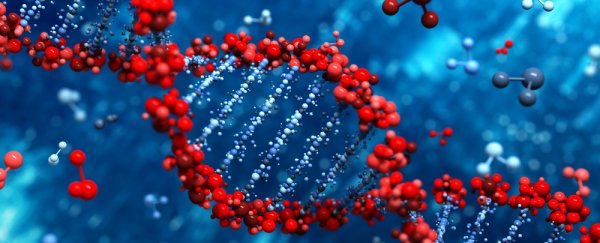Researchers from the UK have found evidence that depression doesn't just change our brains, it can also alter our DNA and the way our cells generate energy.
A team from the Wellcome Trust Centre for Human Genetics investigated the genomes of more than 11,500 women, with the hopes of finding genes that might contribute to the risk of depression. But instead, they stumbled across a signature of metabolic changes in their cells that appears to have been triggered by the disease.
The most notable discovery was that women who had stress-related depression - depression that's associated with some kind of adversity during childhood such as sexual abuse - had more mitochondrial DNA (mtDNA) than their peers. Mitochondria are the 'powerhouse organelles' that provide the energy for the rest of the cell, and an increase in mitochondrial DNA led the researchers to believe that the energy needs of their cells had changed in response to stress.
"We were surprised at the observation that there was a difference in mitochondrial DNA. So surprised it took us a long time to convince ourselves it was real, and not an artefact," said geneticist and one of the lead researchers, Jonathan Flint, in a press release.
After going back over their results, the researchers also found that the women with stress-related depression had shorter telomeres than the healthy women. Telomeres are the caps at the end of our chromosomes that naturally shorten as we age, and the team began to question whether this process had been sped up by stress.
But as we know, correlation doesn't equal causation, so the team decided to test their hypothesis further in mice. Over four weeks, the mice were put under stress, and the researchers monitored any genetic and cellular changes that occured.
Their research, which was published in Current Biology, revealed that the stressed-out mice not only showed an increase in mtDNA, but they also had shorter telomeres than the normal lab mice. These changes seem to be triggered by the stress hormone corticosterone.
According to Flint, these molecular changes may well reflect the body's way of naturally coping with major stress. "Depression might in some sense be considered a metabolic reaction to perceived stress," he said.
The good news is that the research in mice showed that the effects of stress are also partly reversible. The team now hopes that the research will help point out biomarkers of stress and its consequences. It's still very early days, but in the future, looking at mitochondrial DNA levels could help to reveal whether someone has recovered from a trauma.
"We have only a snapshot of the relationship between the molecular markers and depression," said Flint. "We want to know how they change over time - before, during, and after a depressive illness. That information will tell us much about their clinical utility."
It's becoming increasingly clear that the things that affect us emotionally also affect us on a biological level. Earlier this year, a separate team of researchers showed that childhood trauma could alter cellular ageing, and in November 2014, scientists also revealed that meditation and yoga can actually help maintain telomere length. There's no evidence as yet that these types of changes are permanent or will be passed on to future generations.
While there's still a lot to understand, we hope this research will help reduce the stigma surrounding mental disorders and bring more acceptance and support for people suffering from them. It's definitely about time.
